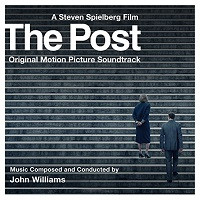- Composed by John Williams
- Sony Classical / 2017 / 40m
The story of the so-called Pentagon Papers, and the struggle of the Washington Post and in particular its editor Ben Bradlee when it came to publishing them, seems an unusually important one to be told today. With Steven Spielberg behind the camera and Tom Hanks and Meryl Streep in front of it, The Post is certainly a prestige movie and has received much acclaim from critics on its initial Oscar-bait release before going into wider release shortly.
After the recent release of the most recent Star Wars movie, along comes another new John Williams score. It’s no longer a given that he will score every Spielberg film (the next one, Ready Player One, is Alan Silvestri’s) but I’m sure they will continue to work together whenever possible and prolong what is I assume the longest collaboration between a major director and composer – both in length of time, and number of films – in Hollywood history. A number of their recent films have seen Williams in pastoral mode, often providing expansive Americana – The Post, being a very different film, offers an opportunity for the composer to do something genuinely different as he works on his first serious thriller in a long time.
 The opening cue, “The Papers”, reminds me a bit of Presumed Innocent. There’s a heavier-than-usual (for Williams) electronic presence, though it goes without saying that the orchestra still dominates. A little motif is repeated throughout the cue which has a certain conspiratorial sound to it, appropriately enough. It’s more a cue of mood than melody – the choppy strings and brass are familiar from the thrillers the composer did in the early-to-mid 1990s. But – as effective as it is at setting the mood – on album it lacks the raw energy and power of something like Nixon or Sleepers.
The opening cue, “The Papers”, reminds me a bit of Presumed Innocent. There’s a heavier-than-usual (for Williams) electronic presence, though it goes without saying that the orchestra still dominates. A little motif is repeated throughout the cue which has a certain conspiratorial sound to it, appropriately enough. It’s more a cue of mood than melody – the choppy strings and brass are familiar from the thrillers the composer did in the early-to-mid 1990s. But – as effective as it is at setting the mood – on album it lacks the raw energy and power of something like Nixon or Sleepers.
The album continues with “The Presses Roll”, which comes from the end of the film – it works well placing it here on the album, because this does give a much-needed adrenaline boost early on. It’s a dramatic piece, compelling thanks in no small part to the rhythmic drive that moves it forward. This is the one time the score does edge towards the quality of Nixon, but in truth even here it doesn’t hit the same heights, largely due to the hugely uncharacteristic lack of any memorable melodic material. The cue’s coda, a gorgeous vignette for strings, is the undoubted highlight.
“Nixon’s Order” is dark but low-key, largely free of incident, then “The Oak Room, 1971” is the first of two gentle lounge jazz source pieces for piano and bass. In “Setting the Type”, things get more dramatic again (lots of strings and winds playing in the lower ends of their ranges) then comes my favourite cue, “Mother and Daughter”, built on a beautifully tender piano tune that is by far the score’s strongest. It is rather fleeting, but sticks around long enough to leave an impression and when the dust settles, I suspect this is what most people will return to in The Post.
We return to more low-key meandering in “Scanning the Papers”, then after another jazz source cue (“Two Martini Lunch”) things do liven up in the last two cues. First comes “Deciding to Publish”, which has a similar tone to the album’s opening cue – it’s quite slow for a while, but when it does get going and that little conspiratorial motif makes a reappearance it’s pretty satisfying. Then comes the grand, eleven-minute “The Court’s Decision and End Credits” which sees Williams enter the comfort zone territory of warm, rich Americana; and as nice as it was for him to leave it earlier in the score, I have to say it’s quite a relief when he goes back there, because I find it much more satisfying.
John Williams has nothing left to prove – he’s been a master at what he does for far longer than I’ve been alive. But like many of his fans, I’ve longed for him to have the chance to do a film or two where he gets to show another side – and The Post is one of them. Even though it is full of all the class you’d expect – it really is all over it – I don’t think it ever really quite catches fire. Dramatic potency is there in patches but not nearly to the same extent as in the scores that I and others have compared this with from the 1990s; and while the lack of a strong main theme is not unprecedented in the Williams/Spielberg roster, it is exceptionally unusual – in Minority Report and War of the Worlds there was plenty else going on to make up for it, but not really in The Post. For sure, at least half the album is very enjoyable – and at its best it’s excellent – just don’t go in expecting too much.
Rating:
***
Low-key drama lacks energy but has great moments
facebook.com/moviewave | twitter.com/MovieWaveDotNet | amazon.com












Spot on James, the points of critic you mentioned are exactly the reason why I did end up in our longlist of great scores of 2017 but didn’t make it any further into shortlist or final 15.
The Top15 you can find on our facebook page.